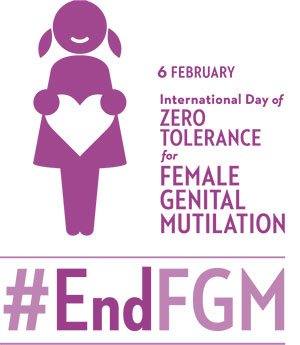Prepared by Kathryn Wilkinson, CFUW VP Education
February 6 is the United Nations International Day of Zero Tolerance for Female Genital Mutilation. The World Health Organization (WHO) estimates that 120 to 140 million women have been subjected to FGM and 3 million girls are at risk each year. So, what is FGM, or as it is sometimes called, female circumcision or cutting? It is a procedure that alters or causes injury to the external female genitalia and is a procedure that has absolutely no health benefits, in fact the reverse. What it involved varies from the partial removal of the clitoris to excising the clitoris and labia and stitching the walls of the vulva, leaving only a tiny opening. According to WHO, FGM can cause severe bleeding and even death at the time of the procedure, infections from tools they used, and later, problems with urination, cysts, infections, as well as complications in childbirth and increased risk of newborn deaths. It can also deny women sexual pleasure.
Mary Laiser is a Masai woman and a Community Facilitator for TEMBO, a Canadian NGO working in a largely Masai community in northern Tanzania. Mary is also a mother and the first woman in her community to refuse to allow her daughter to be circumcised. Among the Masai, this is a coming of age procedure (in some parts of the world, FGM can happen as early as a year old); she invited her family and friends to the circumcision and then announced that it was a celebration of her daughter’s coming of age, not a cutting. It was a very brave move in a very traditional and patriarchal society. Mary now encourages other families to hold alternative ceremonies and teaches about the undesirability of FGM to school children through the Sara/Juma Clubs, to women through outreach classes, and to anyone who will listen.
But, we would be fooling ourselves if we thought that FGM was only an issue in the developing world. In the summer of 2017, the Toronto Star featured an in-depth investigation into FGM in Canada. As a country of immigrants, we know there are women and girls arriving in the country who have been subjected to FGM but there is also evidence that, despite being against the law, girls are being taken abroad for FGM and even having the procedure here in Canada.
The first International Day of Zero Tolerance for Female Genital Mutilation was on February 6, 2003.
The Toronto Star series can be accessed at:
The Girl who said No to FGM – a video
https://www.theguardian.com/society/video/2017/mar/17/jaha-dukureh-promise-fgm-video
The Girl who Said No to FGM is the story of Jaha Dukureh, a survivor of FGM and forced child marriage. She was named by Time magazine as one of the 100 most influential people in the world.
http://www.simonandschuster.co.uk/books/Cut-One-Womans-Fight-Against-FGM-in-Britain-Today/Hibo-Wardere/9781471153983 – non-fiction
The author was mutilated as a six year old before she moved from Somalia to London, England as a teenager. She still lives in London where she works as an FGM campaigner, helping young girls whose families plan to take them abroad for the procedure.
Ayann Hirsi Ali is a Somali-born Dutch activist and feminist. She was circumcised when she was five and has written of the implications of this procedure in her autobiography Infidel. She is outspoken in her criticism both of FGM and male circumcision.

